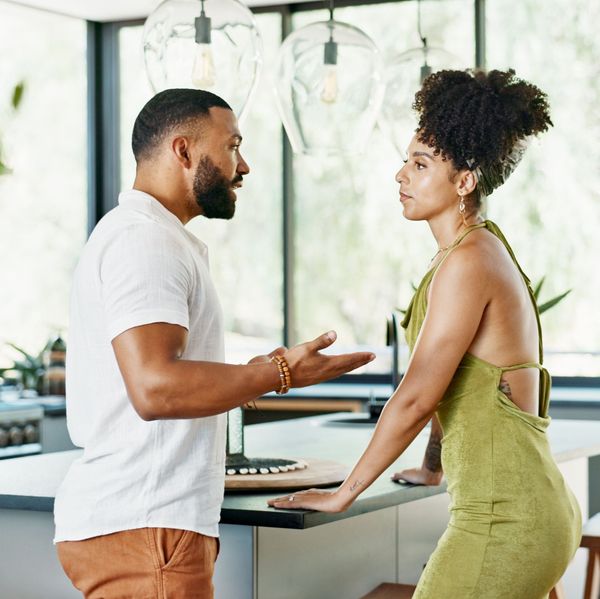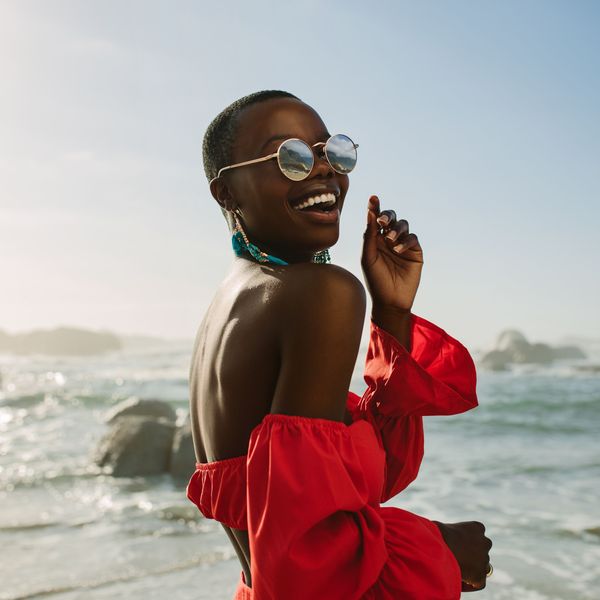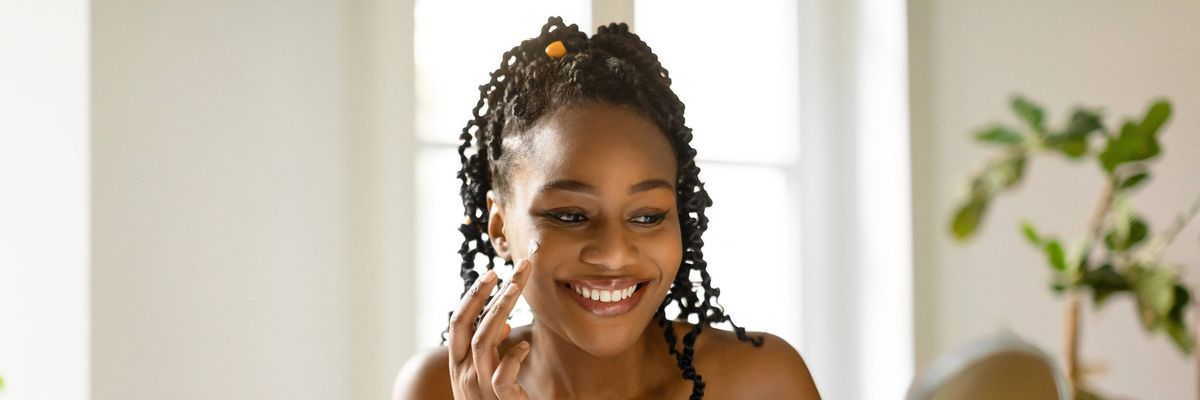'Wakanda Forever' Shows That Black People Can’t Win In The MCU
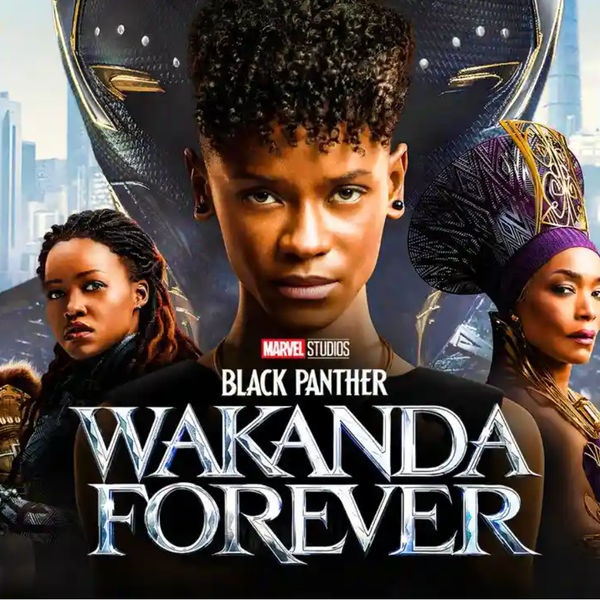
*Warning: this piece contains spoilers for Black Panther 2: Wakanda Forever*
Wakanda Forever is in a no-win situation.
The sequel to the Marvel Cinematic Universe juggernaut Black Panther has the monumental task of honoring its fallen king, Chadwick Boseman, and the character he played, T’Challa, all while continuing on the Black Panther mantel, introducing new characters Riri “IronHeart” Williams (who will have her own Disney+ series) and the antihero Namor and his underwater kingdom Talokan.
It’s impossible to do all of these things well in just one movie, though co-writer and director Ryan Coogler’s effort is valiant. The love for Boseman is palpable, and Wakanda Forever gives us the opportunity to mourn him together, just as we celebrated him in community during Black Panther’s 2018 run.
Though I left the theater in tears after both Black Panther and Wakanda Forever, back in 2018 I wasn’t immediately sure why. This time around, it’s much more clear what hurts: Black people can’t win in the MCU.
Black People Can’t Have Peace
Much of the Black joy around Black Panther was rooted in the idea of Wakanda as the AfroFuture realized. The most advanced nation in the world, shielded from the evils of white colonization, enslavement, extraction and exploitation of resources, Wakanda represented all the beauty, glory and majesty of who we could’ve been, unshackled and without limits.
And yet, all of its leaders are assassinated by outsiders. First, it’s King T’Chaka, who meets his end at the hands of white Sokovian terrorist Zemo in Captain America: Civil War. Then it’s T’Challa, who’s blipped away for five years by Thanos’ snap in Avengers: Infinity War (before returning back to life in Avengers: End Game and dying of an unnamed illness in Wakanda Forever). Finally, it’s Queen Ramonda (Angela Bassett) in Wakanda Forever, assassinated by Namor (Tenoch Huerta) and left face-down, drowned in a flood of his making. It’s a graphic and disturbing image, not just for the characters – particularly her daughter, Princess Shuri (Letitia Wright), who has now lost every single member of her immediate family – but also for the already-grieving audience.
We came to the film expecting to grieve Boseman, whose untimely death from cancer in 2020 we’ve been processing ever since. And we came expecting to grieve T’Challa, knowing that the #RecastTChalla movement had been unsuccessful because, for the filmmakers and cast, Boseman is more than a character who inspired legions of young people. He was an actual person and friend, deeply loved and deeply grieved by his Black Panther family. Acknowledging his death and honoring him with the film rightfully meant more than continuing on with a new actor in the role. All of that, I'd expected and accepted.
But the assassination of Ramonda was cruel and unnecessary, for both the characters and the audience.
Yes, it’s a fictional death, and Angela Bassett played the hell out of it. But with the death of Boseman, our fictions and our realities have too closely intermingled. Killing Ramonda and leaving Shuri orphaned exemplified our all-too-real experience of Black grief in this country. We can’t even burn our mourning clothes before the next tragedy strikes. To still experience this, even in the AfroFuture? That's cruelty.
But it’s the MCU, and superhero origin stories need cruel deaths. T’Challa’s, apparently, wasn’t enough. Shuri’s subsequent journey of being consumed by grief in Wakanda Forever then, mirrors that of T’Challa’s in Civil War–both of which lead to a dissatisfying end.
Black People Can’t Have Vengeance
In 2016’s Civil War, Boseman’s T’Challa has just witnessed the assassination of his father, King T’Chaka, leading him on a path of revenge, that ultimately ends with him sitting on a hill, having a peaceful chat with his father’s killer, Zemo. T’Challa sees how vengeance has destroyed Zemo and lets the terrorist live, choosing the road of forgiveness.
T’Challa’s insistence on vengeance being no way to live continues in Black Panther and contrasts with his uncle N’Jobu (Sterling K. Brown) and cousin, the Black American N’Jadaka, AKA Erik Killmonger (Michael B. Jordan). N’Jobu, who had been a Wakandan spy in America, had found sympathy for and community with Black American freedom fighters. He married a Black American woman who was imprisoned as a revolutionary (according to a deleted scene) and was planning to use vibranium to break her out and arm Black Americans in their fight against their white supremacist overlords. His own brother T’Chaka finds that plan so offensive that it’s worthy of N’Jobu’s immediate arrest and then execution when he resists, without much discussion, let alone tribunal. T’Chaka’s murder of his brother leaves a young Killmonger without a father or a mother.
All grown up, Killmonger comes to Wakanda for the first time to avenge his father N’Jobu. Killmonger also seeks revenge for Wakanda’s isolationist tactics, watching from the safety of their secret borders as Europeans kidnapped West Africans and sold them into slavery in the Americas, colonized most of Africa, and terrorized Black people globally with white supremacy. His keloided body marks the inner corruption vengeance has left on his soul–and there is no doubt, his murderous, misogynistic tactics are less about liberation for all Black people and more about replicating the white power structure with a Black male face as king.
When Killmonger fights T’Challa to maintain control as Wakanda’s king and Black Panther, T’Challa kills Killmonger. As Killmonger dies, T’Challa offers to heal Killmonger, but he’s just too broken and damaged by the impact of slavery and white supremacy on his people in America, too consumed by vengeance to ever be healed, to ever go back to his African home. Trying to get Black people together to get revenge against white people will never fly in the MCU.
Shuri learns as much in Wakanda Forever when her anger and grief over the loss of T’Challa from an unnamed illness leads Namor to believe she will be a good ally to him and his people, the Talokan, who have also suffered because of white supremacists’ efforts to destroy their people. He asks her to burn the world with him in order to protect their people from further distress. She isn’t keen on it, and she’s also not in control; Ramonda is calling the shots. When Namor murders Ramonda, Shuri goes all in on a plan to destroy Namor and the Talokan.
Her deep-seated need for vengeance leads her to meet Killmonger when she goes to the ancestral plane on her journey to becoming Black Panther. It’s at first a welcomed surprise to see him and to see the film allowing a young, dark-skinned Black woman the fullness of her rage on screen. Seeing Killmonger and watching as her rage sets the ancestral plane ablaze, suggest perhaps we might see Wakanda Forever correct the MCU's constant propaganda that “Black people must forgive our oppressors!” Plot twist: it's the same old story.
“Vengeance has consumed us,” Shuri says after she’s got Namor on the ropes, a spear at his throat. She drops her weapon and her vengeance, for the sake of the Wakandans who are getting their asses kicked in the middle of the ocean by the Talokan. “We cannot let it consume our people.”
Shuri has lost everything and everyone, and even still, Ramonda's spirit randomly shows up as a deus ex machina to remind Shuri that vengeance is not appropriate. "Show him who we are," Ramonda says. What is that, if not the same tired Black respectability politics we’ve been fed since slavery?
Black People Can’t Have Unity
Just like in slavery, unity among Black people is the greatest threat to white supremacist power and has been intentionally thwarted for centuries. It’s no different in the MCU. I accept that Killmonger wasn’t actually radical, and his faux-tep philosophy would not have led to Black liberation, but T’Challa didn’t listen to his partner Nakia’s (Lupita Nyong’o) correct takes on Black unity and liberation either.
Nakia wanted to use vibranium to help the people of Africa, and often left Wakanda to go and help people in other African nations as a spy. Does that inspire T’Challa to do her work at a larger scale at the end of Black Panther? No. He builds a STEM program and community centers for some underprivileged Black kids in America; skips right over the African Union or any attempts to unite and empower the Continent; and incomprehensibly takes his knowledge of vibranium to the white supremacist United Nations instead.
In fact, outside of fictional Wakanda – which appropriates many African nations’ languages and cultures to make up the look and feel of Wakanda – there are zero positive depictions of real Africa in the MCU. In Civil War, we see Nigeria’s capital city Lagos completely destroyed (and mispronounced!! several times!!) by the Avengers. In Black Panther, Nigeria is reduced to Boko Haram traffickers of women and children. In Wakanda Forever, there’s mention of a Wakandan hub in Ghana, but we don’t see Ghana outside of the hub, which is guarded by Dora Milaje. We don’t see any other part of Africa in the MCU, and the message is clear: Wakanda has advanced itself so successfully because it has isolated itself from the rest of Africa. It's giving: "not like the other Blacks."
But the worst offense takes place inside of Wakanda’s borders at the end of Black Panther.
King T’Challa, who was thought dead, has arisen, meaning he was not defeated by Killmonger and the challenge for the throne should continue. But Killmonger has no interest in a fair fight; he’s already been crowned king and Black Panther. Inexplicably, this leads to a Wakandan civil war.
Killmonger just got there like the day before; T’Chaka and T’Challa have been mainstays in Wakanda for decades. W’Kabi (Daniel Kaluuya) is T’Challa’s best friend. All of the tribes joyously celebrated T’Challa being crowned king the week before. And yet, W’Kabi leads his tribe and others into war against fellow Wakandans and many, many are killed, including members of the Dora Milaje. This is the problem of having an all-Black setting in the MCU: action movies need battle scenes, so a lot of Black people will be killed on screen and even Wakanda itself will have to get trashed.
Wakanda is the most technologically advanced nation in the MCU; they’ve never been colonized, and still their ways of handling conflict are steeped in age-old white supremacist tactics of violence, domination and control. The math don’t add!
To make matters more disgusting, Nakia and T’Challa have brought a white CIA agent into Wakanda, Everett Ross, who is not only given life-saving treatment for his injuries and a tour of Wakanda’s secrets as a literal AGENT OF THE CIA, but he's also given weapons by Shuri to shoot down Wakandan pilots in the civil war. The entire reason T’Challa won’t help African nations or the Black diaspora is to protect the safety and security of Wakanda – which completely goes out the window when a random white cop is down bad?
Coogler, Oakland’s own, is very well aware of the history of the CIA, FBI and global police efforts to destroy Black liberation movements, and particularly the Black Panthers. But it’s the MCU; the “good white cop who has Black friends” is their entire MO (see Captain America, Iron Man, Thor…). Still, Agent Ross’s seemingly irrevocable invitation to the Black Panther franchise cookout is an affront and jokingly calling him “colonizer” doesn’t make up for it.
Contrast the Wakandan civil war with the Avengers in Civil War, where the Avengers split into two factions and fight each other. When one Avenger gets seriously injured, the fighting stops. They love each other too much to kill each other. Wakandans – who literally only know each other because they’ve been isolated from the rest of the world for their entire existence – kill each other with ease. What message does that send about Wakanda, about Africa?
Meanwhile, as Black countrymen are killing each other, Zemo, the white man who murdered their king, is still alive and well.
And so are the white French soldiers in Wakanda Forever who attack Wakanda’s hub in Ghana, armed to the teeth and looking for vibranium. The Dora Milaje disarm them and bring them – handcuffed yet unscathed – into a United Nations meeting to help Queen Ramonda make her point about how corrupt these white countries are.
Yet Okoye receives no such leniency from Ramonda when Okoye valiantly loses her fight against a gang of Talokan warriors with superhuman strength who kidnap Shuri and Riri. Ramonda strips Okoye of her rank as general and banishes her from the Dora Milaje, ignoring pleas for mercy from the Council. Ramonda also mentions that Okoye’s “treacherous” husband W’Kabi is in banishment after siding with Killmonger during the civil war.
All of this begs the question: What is justice in Wakanda and how does the most advanced nation on earth dole it out to its own? Murder and banishment and war are all we see.
This continues in Wakanda Forever when Namor approaches Wakanda to team up against white colonizers. I’ll admit, when Namor shows up dripping in vibranium because Wakanda wasn’t in fact the only special place where vibranium formed, I thought, Man…Black people can’t have nothing! Still, I was all for a film exploring the joint struggle of Black and Mayan communities and how we’re naturally allies. But it’s the MCU; Disney would pull the plug on the whole franchise if Marvel actually let Black and Mayan people team up to take down white supremacy for real. So Wakanda Forever spends the majority of its action with the Black and Mayan people killing each other, becoming allies at the very last possible minute, without showing what “allyship” actually looks like. Guess we’ll see what the MCU allows in Black Panther 3.
But as for Wakandan and Black American unity, that future is still to be seen. In Black Panther, Okoye spits the word “Americans,” and with Killmonger’s death and the heartbreaking message that Black American descendants of enslaved Africans might just be too messed up to reconnect with Africa, Black Panther surely makes no space for an end to the Diaspora Wars.
The only other Black Americans in that film are some nameless boys in the ‘hood in Oakland, whom T’Challa attempts to rescue through his charitable STEM program. Get ‘em while they’re young, I guess. But if Black Americans can only receive Wakandan charity rather than exchange of ideas, of cultures, of language, there's no hope for unity.
The inclusion of Riri Williams in Wakanda Forever, however, may be an attempt at correction, as she’s the first Black American young woman character in the franchise. She’s not quite an equal to the Wakandans we know, as she's a 19-year-old college kid. But she is also a prodigy and a mentee for Shuri, and I’m here for their Black girl brilliance and the growing bond between them. But Shuri won't let Riri take her IronHeart suit back to America with her. Shuri is still in control.
Even Wakanda Forever 's introduction of Haiti and Black life in the Caribbean to the MCU still puts Wakanda in the position of teacher, as Nakia is the headmaster of the school featured there and in charge of educating Haitian children. Coogler choosing Haiti as a site of healing and connection and writing that Nakia and T'Challa name their son Toussaint to honor the revolutionary history of Haiti seem like narrative steps toward Wakanda's community building in the Diaspora. But knowing Haiti's current real life level of devastation after the 2021 hurricane, I need some receipts that Wakanda is doing more to empower Haiti than just running one self-sustaining school.
Further franchise installments should account for the incessant lack of Black unity both inside Wakanda and throughout the Diaspora. Without colonization and white supremacy, Wakanda should’ve been leading the charge on how to show care and solve intracommunal conflict.
But, again, it’s the MCU. That means these movies can’t possibly be revolutionary beyond the veneer of representation.
Black People Can’t Be Free
And sure, representation matters, but then what?
What was gained by the extremely mild showing of affection in Wakanda Forever between Dora Milaje warriors Aneka (a wasted Michaela Coel) and Ayo (Florence Kasumba), two queer characters in the comics whose relationship is diminished to a two-second peck on the bald head? Is it enough to know that Black queer characters exist in this world, even if they can’t do anything particularly queer so that Marvel can increase the odds that China will let the movie open in its country? (Surprise! China wasn’t ever gonna let them do that, anyway.)
What was gained by taking Okoye, who found such pride, joy and beauty in her bald head in Black Panther, and reducing her looks to punchlines in Wakanda Forever? This happens both inside Wakanda by M’Baku in front of the Council, where this leader is supposed to be respected and revered, and outside Wakanda by the young genius Riri who couldn't think of a better comeback than calling her bald head ashy. This passes as comedy in 2022?
What was gained by making M’Baku king and setting up the reveal of a secret 6-year-old son for T’Challa? These choices seemed like throwing bones to the #RecastTchalla crowd who mourned the loss of Black male power more than anything else. Sure, the idea of a secret son could bring some comfort that the T'Challa character will live on in the future and that Shuri does still have one relative left. But more than anything, it makes its secret-holding characters look especially cruel.
For a year, the son was grieving the loss of his father, as were Ramonda and Shuri and all of Wakanda. They could've been grieving together. Wakanda Forever opens with this gorgeous, all-white funeral for T'Challa, emphasizing the Wakandan tradition of grieving and healing in community, which only makes Nakia's nonsense reasoning for not bringing the boy to attend the funeral and meet his aunt all the more unbelievable – especially considering the turmoil that Killmonger being disconnected from Wakanda had caused.
But the worst grandmother of the year award goes to Ramonda, who not only knew about her secret grandson and didn't tell her grieving daughter, but she also sent his only living parent off on a dangerous rescue mission, leaving the child behind in Haiti (with whom?!). It's such an unsavory series of choices that goes against so much of what we've learned over two films about these characters and their love for Wakanda, in exchange for an emotionally manipulative surprise ending.
It only further highlights the fact that these characters haven't been developed enough and neither has Wakanda. Besides letting women fight in battle and rule the kingdom when the men they’re connected to become ancestors, we don’t know much about Wakandan culture and values outside of the royal walls, since we never meet any regular degular Wakandans. Is there homelessness? Free healthcare? Hopefully flood insurance? We don't know. But even without the infiltration of white supremacy and colonization, it seems that Black people in Wakanda are only free to a degree. And that’s by design.
Outside of the MCU, these films wouldn't have had the tentpole, blockbuster reach or success; they wouldn't even exist. Still, they could’ve been so much more than the fashion, the memes, and the need for representation that initially brought us together behind this franchise – though that 2018 moment in history was a gift that can never be replicated. We wanted a king and Chadwick was a beautiful one. We wanted Black women exercising agency and power. We wanted dark-skinned beauty representation and we got all of that, so we let some anti-Black, anti-Black American and anti-African sentiments cook.
But we deserve more. We deserve a story about Africanness and Diasporic Blackness that’s not hampered by the white gaze that would refuse us peace, justice, unity and vengeance. In the MCU, no matter who’s at the helm, that’s just not possible.
Let’s make things inbox official! Sign up for the xoNecole newsletter for daily love, wellness, career, and exclusive content delivered straight to your inbox.
Your December 2025 Monthly Horoscopes Are All About Surrender & Alignment
December is about letting go. We end the year with the need for more peace, reflection, and rejuvenation, and that is exactly what December is providing for us. The Sun is in Sagittarius, and anything is possible. This is the month to believe in that and to know that the universe is supporting you. With a Supermoon in Gemini as we begin the month as well, we have an opportunity to gain the closure we have been looking for this year and to wrap up old projects, ideas, and communication breakthroughs.
This is the month to make your peace the priority and let go of trying to control the way the tides are turning. Trust in your new beginning, and give yourself time to prepare for it this month.
A big part of the clarity that is coming through this month is due to Neptune going direct in Pisces on December 10, after being retrograde here since July. With Neptune now direct, we are able to see our inspiration and creativity a little more clearly, providing the perfect energy for dreams and manifestation to be built upon. The smoke is clearing, and it’s up to you to decide what you want to do with this newfound clarity that this transit is bringing. Mercury also moves back into Sagittarius on December 11, which is great for communication and clarity, and the adventures you were trying to see through at the beginning of November come around for you again with greater purpose and support.
On December 15, Mars enters Capricorn until the end of January 2026, and this is the extra push we need to make important changes and to be on the path towards greater abundance, stability, and prosperity. Mars in Capricorn takes care of business, and we have extra energy at our disposal during this time to do so. This transit is an ideal time to focus on your career or financial goals for next year and to start putting some of these plans into motion now. A few days later, we have the New Moon of the month, which will be in Sagittarius on December 19, and this is the perfect New Moon to manifest.
The energy is high, magic is in the air, and it’s all about moving forward with the new beginnings that are inspiring you and bringing you joy to think about right now.
Capricorn Season officially begins on December 21, and this earth sign energy is how we heal, gain closure, and build new foundations in our world. With Venus also moving into a Capricorn a few days later, there is something about peace, prosperity, and security that we are gaining in life and in love as we close out the year, and this is what we need right now. This month is about reflecting on what was, letting go of old hurt, and renewing. December is an ending and a new beginning in one, and there is magic in this space to be created.
Read for your sun and rising sign below to see what December 2025 has in store for you.
 AriesKyra Jay for xoNecole
AriesKyra Jay for xoNecoleARIES
December is a full-circle moment for you, Aries. You are seeing the gifts in your world and have a lot of gratitude for the way things have come about for you as of late. There are culminations in your world that are providing you with more abundance, stability, and community, and you are exactly where you are meant to be this month. With the Sun in a fellow fire sign and in your 9th house of travel for most of the month, December is a good time to get out of your comfort zone, explore the world around you, and get your body moving.
Mars, your ruling planet, also makes a change and moves into Capricorn on December 15, which will fuel your inspiration and power in your career space. You are making a lot of professional progress as we close out the year; however, make sure to be more mindful of your competitive drive right now. The New Moon on December 19 is the perfect opportunity for you to create some new plans and goals when it comes to traveling, education, and where you want to gain some new inspiration in your world. Overall, this is a month of things coming together for you serendipitously.
 TaurusKyra Jay for xoNecole
TaurusKyra Jay for xoNecoleTAURUS
December is about trusting your intuition, Taurus. You have a lot on your mind this month, and it’s best to delegate, communicate, and allow yourself some relief by opening up to someone and not feeling like you have to hold everything in. As we begin the month, we have a Supermoon in Gemini happening in your house of income, and the plans and projects you have been building here come to fruition for you now. This is the time to gain clarity on your financial world and to take a look at what spending habits you want to let go of here as well.
With Venus in your 8th house of shared resources for most of the month, you are doing a cleanse on your commitments, partnerships, and business ventures. You are taking a look at what you want to dedicate yourself to in the future, and what commitments you may need to let go of now in order to be in the space you truly want to be, both financially and within some of your relationship dynamics. Before we end the month, we have a New Moon in this same area of your chart, and it’s time to look at the opportunities that are presenting themselves and to trust your internal guidance system to lead you forward.
 GeminiKyra Jay for xoNecole
GeminiKyra Jay for xoNecoleGEMINI
You are moving forward fearlessly this month, Gemini. December is your month of love, passion, and dignity, and you are owning the light that you shine. We begin the month with the last Supermoon of the year, happening in your sign, and you are stepping up to the plate. You are showing up, owning how much you have grown this year, and allowing yourself to heal while also acknowledging that you have done your best and you deserve to have fun in the midst of the changes you are creating.
Mercury, your ruling planet, is officially out of retrograde, and you can use this energy to the fullest potential now. With Mercury in your 7th house of love, it’s time to speak from the heart and to talk about the things that matter and that are inspiring you right now to your loved ones. You never know what kind of epiphanies you may have when you open up the conversation to others. Before the month ends, you have a New Moon in this same love area of your chart, and this New Moon is all about manifesting romance, commitment, and abundance in your world.
 CancerKyra Jay for xoNecole
CancerKyra Jay for xoNecoleCANCER
December is an opening for more love, more joy, and more freedom in your life, Cancer. You have come to a place where you hold so much gratitude in your heart for where you are today and where your heart is shining, and things come together for you with more ease right now. With the Sun in your 6th house of health, work, and daily routines for most of the month, you are getting your ducks in a row while also putting more energy and effort into taking care of yourself, your priorities, and your well-being. This month surprises you in many ways, and it’s because you are showing up.
Mars and Venus both move into your house of love, relationships, marriage, and abundance this month, and you are making strides in your love life. You have both of these opposing forces on your side and are being recognized for the love you are while also receiving the love you want. This month, overall, is about focusing more on the positives in your world and letting your heart have its joy. Before December comes to an end, there is a New Moon in Sagittarius, and this is the perfect opportunity to create the plans you want to see through next year, especially when it comes to your work life, colleagues, business ventures, and health.
 LeoKyra Jay for xoNecole
LeoKyra Jay for xoNecoleLEO
The scales of karma are balancing, and they are balancing in your favor this month, Leo. December is your month of truth, and of seeing it clearly in your world. The Sun is in your house of romance, pleasure, and happiness for most of the month, and it’s time to relax, be in the present moment, and allow what is meant to be, to be. With a Supermoon in your 11th house of manifestation as December begins, this is a powerful month for seeing your dreams come to fruition, and for feeling like the intentions you have set this year are finally here for you now.
Mars also moves into your 6th house mid-month, and this is the perfect energy to have to move into the new year. You have extra energy at your disposal right now and are feeling fearless with what is possible for you and your daily routine. Before the month ends, we also have a New Moon in a fellow fire sign, Sagittarius, and this is a breakthrough moment for you and your heart. December, overall, wants to show you how loved and supported you are and will be doing so in magical, unexpected, and concrete ways.
 VirgoKyra Jay for xoNecole
VirgoKyra Jay for xoNecoleVIRGO
December is a month of victory, Virgo. You are showing up and experiencing some new successes in your world that move you forward on your path in life. With a Supermoon in your 10th house of career as we begin the month, the effort and intentions you have made this year come into full bloom, and you are being recognized for who you are and the good work you have done. This month is all about showing up and allowing yourself to be seen and loved, knowing that you deserve the support and opportunities you are receiving.
Mars moves into Capricorn on December 15, which brings the passion and excitement into your love life, hobbies, and little pleasures in life that light you up. You want to have fun this month and are going to be walking into the new year with this fearless, happy, and spontaneous energy within you. Before the month ends, Venus also enters Capricorn, and in this same area of your chart, you have a lot to look forward to and believe in right now. Overall, December wants you to be happy and will be doing everything possible to make that happen for you. This is your month to shine, Virgo.
 LibraKyra Jay for xoNecole
LibraKyra Jay for xoNecoleLIBRA
December is a month of opportunity for you, Libra. New doors open, and you are financially making breakthroughs this month because of it. December begins with a Supermoon in your 9th house, and you are getting a clearer view of where you have been making strides in your life and how it has all brought you here to this present moment of freedom. This month is showing you what happens when you are fearless with your purpose and when you believe in yourself and what you are worthy of.
Moving further into December, Mars moves into your 4th house of home and family mid-month, and you are closing out the year in your safe spaces. You are spending more time with your loved ones and taking the time to quiet your mind and listen to what your heart has been telling you. Before the month ends, we have a New Moon in Sagittarius, happening in an area of your life that deals with communication. This is a great time for getting the answers you have been looking for and for feeling more clear-headed and confident about the decisions you are making as you move into the new year.
 ScorpioKyra Jay for xoNecole
ScorpioKyra Jay for xoNecoleSCORPIO
Patience is a virtue this month, Scorpio. December is all about remaining patient and vigilant with what you are creating in your world, and knowing that the universe has your back. It’s time to be reminded of the power of hope, and this month is an opening to greater clarity in your life. There is a lot of energy in your financial zones right now, and this is providing you with new opportunities and new insight; however, the speed at which things come about for you may feel daunting. Keep your head up and eyes focused on what you want and know that you are more than worthy of receiving it.
With Mercury in your 2nd house of income this month, December is a good time to plant new seeds and to think about where you want to be financially a month from now or even a year. This month is asking you to think bigger and to think more long-term so that you can set the appropriate plans into motion now. We also have a New Moon in your house of income before the month ends, and this is when you will see more of your dreams come to fruition in this area of your life, and have more opportunities to build. Overall, December will be teaching you a lot, Scorpio.
 SagittariusKyra Jay for xoNecole
SagittariusKyra Jay for xoNecoleSAGITTARIUS
Sagittarius Season is here, and there is a lot in store for you this month, Sag. December is all about what you are dedicating yourself to. It’s about setting your intentions and putting the work in to back up your dreams, and about getting things in order so that when the new beginnings come, you are ready for them. The Sun and Venus are in your sign for most of this month, and there are a lot of eyes on you right now. You have the potential to create a new beginning for yourself, and it’s time to invest in yourself, your love life, and your dreams.
Mercury moves into Sagittarius on December 11, and this is giving you another opportunity to see through some of the plans that you had initiated in November. Mercury was retrograde in your sign last month, and there may have been some disruptions to your vision and plans for the future, and now this energy is turning around for you. Before the month ends, we also have a New Moon in Sagittarius, and you are walking through new doors fearlessly. You are catching others by surprise by your growth this month, and you are thinking a lot about your purpose, future, and plans for the new year.
 CapricornKyra Jay for xoNecole
CapricornKyra Jay for xoNecoleCAPRICORN
December is all about the vision, Capricorn. You are moving through a lot of changes and transformations this month, yet they are giving you a chance at a new beginning in the process. You are focused more on the future and what goals you want to manifest for yourself right now, and are ready to let go of what hasn’t been working for you. With the Sun in your 12th house of closure for most of December, this is your time for healing, but remember, healing doesn’t have to be isolating or boring; you can thrive while you renew, and you are this month.
Mid-month, the excitement picks up for you, and you are feeling more energized than you have in a while. Mars moves into Capricorn until the end of January 2026, and you are being proactive with your goals, intentions, and passions. You are a force to be reckoned with this month, and you are making things happen for yourself with confidence. Capricorn Season officially begins on December 21 this year, and this is definitely speeding up your healing process. You are breaking free from what was, and with Venus also moving into Capricorn before the month ends, you are leaving this year in high spirits and with love opening a new door for you.
 AquariusKyra Jay for xoNecole
AquariusKyra Jay for xoNecoleAQUARIUS
December is all about community, creativity, and manifestation, Aquarius. This is the month to work together with others to help bring your dreams to life. You are in a space of inspiration, empowerment, and beauty, and are creating more of this energy around you and in your world. Look out for what support comes your way this month and know that you don’t have to do everything alone to succeed. With the Sun in your 11th house of manifestation and friendship, your intentions are coming to fruition, and it’s time to celebrate with the people you love and to own how far you have come this year.
On December 19, we have a New Moon in Sagittarius, lighting up your life in all of the best ways possible. This is your New Moon of freedom, victory, and magic, and you are seeing new beginnings appear that you were once just hoping for. Before the month comes to an end, Venus moves into your 12th house of closure, and after an active and successful month, you are ready to relax, heal, and give your heart some of the attention it has been asking for. You are moving into the new year with the need to release and renew what hasn’t been working in your relationships, and you are finally ready to.
 PiscesKyra Jay for xoNecole
PiscesKyra Jay for xoNecolePISCES
December is a big month for you, Pisces. You are making some huge accomplishments this month, and are feeling like everything you have been through this year has been worth it for these moments that are coming to fruition for you now. The Sun is in your 10th house of career and reputation for most of the month, and this is where a lot of your focus is right now. You are claiming your successes and putting yourself out there in ways that not only serve you, but that inspire others as well.
Neptune officially goes direct on December 10, after being retrograde in your sign since July, and you are finally seeing things a little more clearly. You are feeling renewed inspiration and passion in your life, and your intuition is your strongest asset right now. Before December comes to an end, we also have a New Moon in your 10th house of career, and what happens now not only changes things for you in the present, but it also opens new doors and what is possible for you in the new year as well. Overall, you are on top of your game this month and are owning the joy and empowerment you feel.
Featured image by Kyra Jay for xoNecole
Cold winds. Wool clothes. Flannel sheets. These are just some of the things that skin has to go through whenever the temperature drops below freezing — and boy, can that wreak real havoc on it if you’re trying to have super soft and smooth skin that looks amazing in your holiday party outfits and feels unbelievable as you’re cuddling up to your bae.
And you know what? The key to combating dry, cracked, rough, dull, and irritated skin during the fall and winter seasons is to be proactive about preventing it from happening in the first place. Luckily, I’ve got eight quick tips that can keep your skin dewy and radiant — no matter what these next few months, weather-wise, have in mind.
1. Turn the Temperatures Down
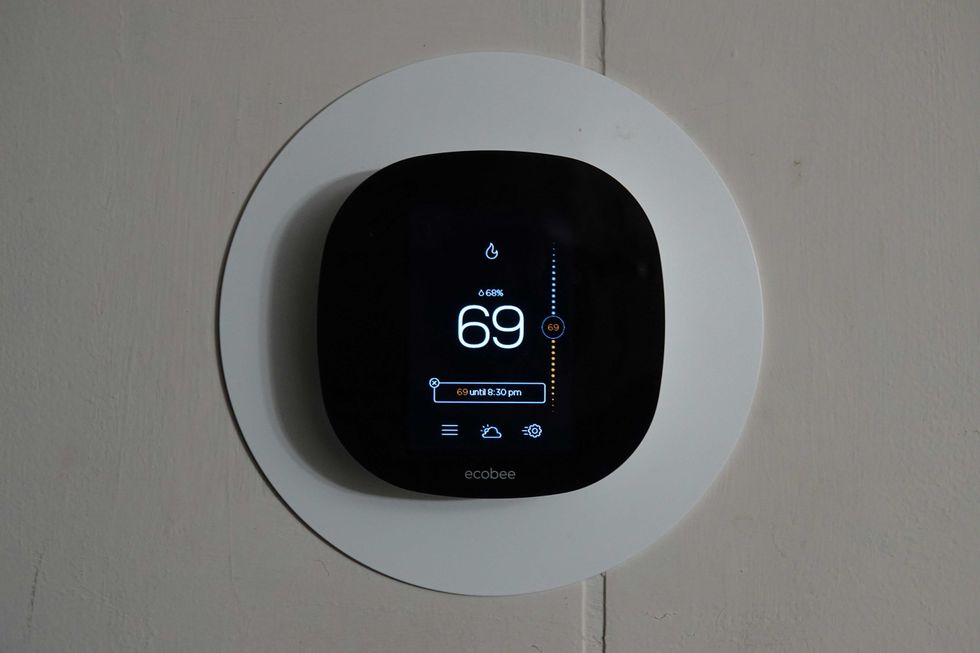
Unsplash
There is nothing like coming in from the bitter cold and feeling the heat from your HVAC unit. Problem is, since the air draws moisture out while constantly circulating warm-to-hot air in the process, that can totally dehydrate your skin — and dry skin tends to feel rough, flaky and tight.
One way to combat this is to keep your thermostat(s) set to somewhere around 68 degrees; not only is that good for maintaining some level of moisture in the air, your electricity bills will remain bearable that way as well.
2. Eat/Drink Less of What Dehydrates You

Unsplash
Did you know that there are certain foods that, one way or another, will play a role in dehydrating you? Sugary foods will cause you to release more fluids through your system. Salty foods can absorb hydration in your body. Alcohol and caffeine are considered to be diuretics which means that they take more fluids from you than they actually provide.
And something else that can take more water from you than it should? Believe it or not, protein. Although it does come with its benefits, because it can put a bit of strain on your kidneys, you may need to drink more water, just so that you can get rid of toxins easier.
Meanwhile, foods that will hydrate you are fresh fruits and veggies. Ones that are in this season include apples, grapes, collard greens, celery, pears, cabbage and winter squash.
3. Go with Unscented Body Washes

Unsplash
Some of you may not like this one; however, if you read it all the way through, I have an alternative that may just put a smile on your face. Okay, so your scented body washes — yeah, if you want healthy and supple skin, you should scale back on those bad boys. The reason why is because many of them contain sulfates and artificial fragrances that are harsh on your skin and can end up drying it out.
The alternative? Use unscented ones and then add an essential oil scent to it. For the record, ones that actually help to soften your skin include lavender, sandalwood, chamomile, frankincense and rose.
4. Exfoliate Less. Hydrate More.

Unsplash
Since your skin sheds somewhere around 30,000 skin cells a minute (wild, right?), it is absolutely essential that you exfoliate your skin year-round. After all, exfoliating is what not only removes dead skin cells and unclog pores, it also helps significantly improve your skin’s tone and texture by increasing the collagen production that is in it. However, since it also has a way of drying out your skin, it’s important that you gently exfoliate during this time of year; this means less scrubs and dry brushing less often.
Instead, exfoliate with certain skin acids (which I will get to in a sec) and focus on doing what will hydrate your skin more including drinking plenty of water and applying serums to your skin. Serums are a light product that is full of ingredients that are especially designed to help moisturize and protect your skin.
5. Apply Some Acids (Yep, You Read That Right)

Unsplash
On the surface (no pun intended), it might seem odd that acid can help to soften your skin yet that is absolutely the truth. Examples? While hyaluronic acid (check out “Why Your Skin, Hair, And Nails Need Hyaluronic Acid Like...Yesterday”) is a humectant that helps to moisturize your skin and reduce any “roughness” that it may feel, malic acid is an alpha hydroxy acid that improves your skin’s texture.
And while lactic acid is a fruit acid that provides moisture by increasing collagen production, mandelic acid (one of my current faves) will help to even and smooth your skin right on out.
6. Try Some (Holiday-Scented) Oils and Creams
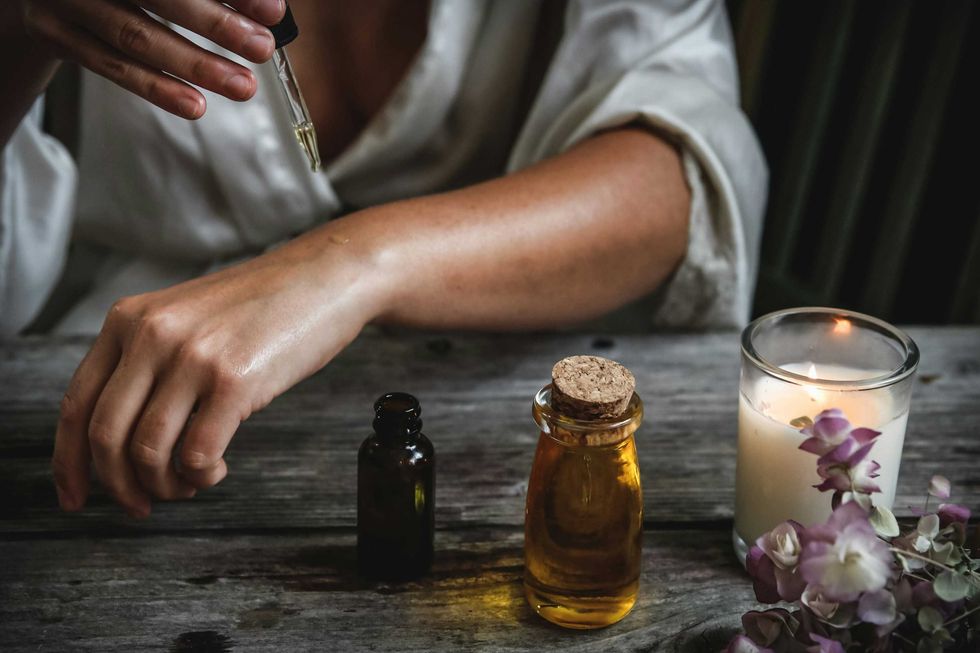
Unsplash
If you want to provide a barrier for your skin from the cold weather and bitter winds, you should consider applying oils to your skin; ones that are packed with fatty acids like avocado, sunflower and grapeseed. Creams can be super nourishing for your skin too; that’s because they have a way of locking in moisture for longer periods of time.
And if you really want to take things up a notch, add some holiday-scented essential oils to your oils and creams — ones like vanilla, clove, cranberry, peppermint and plum. You can even mix one or two together to create a signature scent that is all your own.
7. Put Rosehip Oil on Your Lips
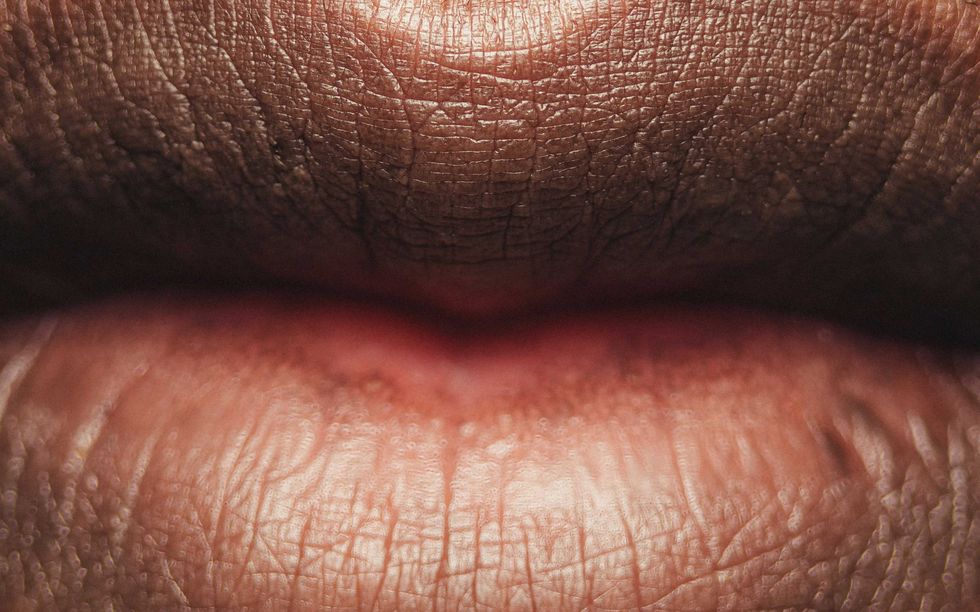
Unsplash
What would be the point in having silky smooth skin if your lips are dry and chapped? C’mon now. That’s why, especially before you turn in every night, it’s a good idea to apply a coat of rosehip oil to your lips. Not only are the properties in the oil extremely moisturizing and hydrating, it’s the kind of oil that can help to cultivate new cells to your lips and even create collagen so that they appear firm and youthful.
8. Turn on Your Humidifier

Unsplash
The reason why I wrote “10 Really Good Reasons To Get Yourself A Humidifier This Fall” a few years back is because folks tend to really underestimate how beneficial a humidifier can be. When it comes to your skin, specifically, you should consider investing in one because the added air moisture that they provide helps to hydrate your skin as well as balance sebum levels, provide a protective barrier from indoor air pollution and soothe irritated skin as well.
And since sleep is a way to restore your skin, having a humidifier going in your bedroom will take “beauty sleep” and super smooth skin to a whole ‘nother level. Enjoy!
Let’s make things inbox official! Sign up for the xoNecole newsletter for love, wellness, career, and exclusive content delivered straight to your inbox.
Featured image by Prostock-studio/Shutterstock



